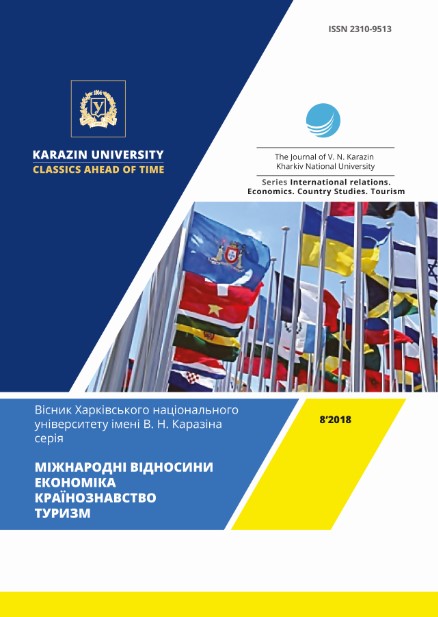International trade and uneven distribution of income
Abstract
The turbulent events of the last quarter of the 20th century (the collapse of the socialist system and the transition of the post-socialist countries to a market economy, China's accession to the world market and the successive trends of trade liberalization in a number of countries) do not doubt that trade and technology play an important role in changing the structure of production and wages throughout the world. At the beginning of the 20th century globalization tendencies were transformed into a deglobalization. This was partially due to the fact that growth of international trade did not properly contribute to the welfare of people and the mitigation of income polarization as it was expected to. Although, there is no doubt that trade and technology have played an important role in the change of production structure and salaries around the world. The subject of research in the article are the main causes and consequences of the polarization of income in the world economy. The purpose of the study is to identify the impact of the growth of international trade on human well-being and reduction of income polarization.The main objective of the study is to analyze the dynamics of income distribution in the world in the context of the expansion of international trade. The article uses general scientific methods: system analysis - to determine the features of the development of international trade, a method of scientific abstraction that allows to present the general nature of the uneven distribution of income in the world economy and to make assumptions about the expected future through extrapolating data. Results: Based on the analysis of the dynamics of the change in the basic indicators of income distribution, the problem aspects of the impact of international trade on the polarization of the world population's incomes are revealed.Conclusion:According to studies,economic growth rates deepened inequality between countries, as some have learned to benefit from new opportunities better than others. Moreover, it turned out that trade is affecting the labor market disproportionately even within one country.
Downloads
References
Маллаби С. Перезагрузка глобализации // Финансы и развитие: ежеквартальный журнал Международного Валютного Фонда –2016 – Выпуск 53. – Номер 4. – С. 7.
Freeman Richard B. The Great Doubling: The Challenge of the New Global Labor Market, 2007, in Ending Poverty in America: How to Restore the American Dream, ed. by John Edwards, Marion Crain, and Arne L. Kalleberg (New York: New Press).
Обстфельд М. Возвращение на путь свободной торговли // Финансы и развитие: ежеквартальный журнал Международного Валютного Фонда –2016. – Выпуск 53. – Номер 4. – С. 14-15.
Feenstra Robert C., Gordon H. Hanson 1996 Globalization, Outsourcing, and Wage Inequality // American Economic Review, Vol. 86. – 1996. – No. 2. – pp. 240–245.
Verhoogen Eric. Trade, Quality Upgrading, and Wage Inequality in the Mexican Manufacturing Sector,” Quarterly Journal of Economics, Vol. 123. – 2008. – No. 2. – pp. 489–530; Brambilla, Irene, Daniel Lederman, and Guido Porto, 2012, “Exports, Export Destinations, and Skills,” American Economic Review, Vol. 102. – No. 7. – pp. 34–38.
Brian Mc Caig. Exporting out of Poverty: Provincial Poverty in Vietnam and U.S. Market Access // Journal of International Economics, Vol. 85. – 2011. – No. 1. – pp. 102–13.
Topalova Petia. Factor Immobility and Regional Impacts of Trade Liberalization: Evidence on Poverty from India // American Economic Journal: Applied Economics, Vol. 2. – 2010. – No. 4. – pp. 1–41.
Babenko V., Sidorov V., Savin R. Activities of international agroholdings in the world market of foreign investments: investigation of trends and factors of impact in current financing conditions // Technology audit and production reserves. – Vol. 4, No 4 (42), 2018. – P. 18-24. DOI: https://doi.org/10.15587/2312-8372.2018.141135
Dix-Carneiro Rafael, Brian Kovak, 2015, Trade Liberalization and Regional Dynamics, unpublished (Durham, North Carolina: Duke University).
Бабенко В.О., Сідоров В.І., Фірсанова В.О., Бондаренко М.І. Дослідження розвитку інтеграційних процесів у глобальній системі міжнародної торгівлі // «Вісник соціально-економічних досліджень» Одеського національного економічного університету, 2018. – № 1 (65). – С. 36-48.
Павчник Н. В богатстве и в бедности // Финансы и развитие: ежеквартальный журнал Международного Валютного Фонда –2016 – Выпуск 53. – Номер 4. – С. 34-35.
Кругман П. Не будите зомби // Финансы и развитие: ежеквартальный журнал Международного Валютного Фонда –2016 – Выпуск 53. – Номер 4. – С.11
Authors who publish with this journal agree to the following terms:
- Authors retain copyright and grant the journal right of first publication of this work under the terms of a license Creative Commons Attribution License 4.0 International (CC BY 4.0).
- Authors are able to enter into separate, additional contractual arrangements for the non-exclusive distribution of the journal's published version of the work (e.g., post it to an institutional repository or publish it in a book), with an acknowledgement of its initial publication in this journal.
- Authors are permitted and encouraged to post their work online (e.g., in institutional repositories or on their website) prior to and during the submission process, as it can lead to productive exchanges, as well as earlier and greater citation of published work.




